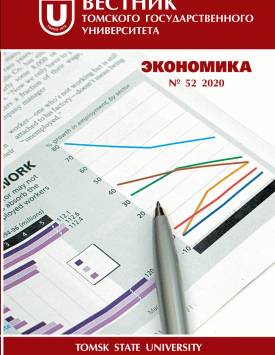The Role of the Service Sector in the Socioeconomic Development of Moscow
The article shows the determining role of the service sector in the economic and social development of Moscow. The dynamics of changes in the share of services in the structure of employment, the general building fund development, the production of gross regional product, the income and expenditure of the city budget are examined. The levels of the service sector development in Moscow and abroad in terms of the share of the service economy in the structure of employment and the production of gross regional product are compared. It is concluded that the service sector development in Moscow corresponds to that in the economically developed foreign countries. The service sector affects the social development of society, the growth of human potential, determines the lifestyle of the population, the model of consumer behavior. A developed service sector creates a comfortable urban environment, provides a high quality of life. The role of the service sector in the socioeconomic development of Moscow is studied. The growth of the share of the services economy in the structure of the socioeconomic complex is revealed; it is typical for the stage of transition to post-industrial development. The relationship between the dynamics and structure of the service sector, the formation of a new model of employment, life quality improvement, and human capital development is determined. The main components of the quality of life that determine the needs for the development and placement of service facilities in the city are considered. The role of the service sector in the socioeconomic development of Moscow for accounting in forecasting, design and management decisions in the development of social, administrative and business facilities in the city, the creation of jobs in the service economy in the transition to the knowledge economy and information technology is assessed. The research is carried out on the basis of official statistics (Rosstat, Mosgorstat), branch departments and directorates of Moscow. Statistical, analytical, sociological methods of research, expert assessments, analogies, field survey, mathematical modeling are used. The tendency is noted of the increasing role of the service sector in the socioeconomic development of Moscow, characteristic of the transition to the post-industrial type of economy: the growth of the share of the service economy in the structure of the economic complex, the growing impact on the level and quality of life, the reproduction of human capital, the formation of a comfortable environment. The tasks and main directions of the development of social infrastructure, an important component of the service sector, are formulated. The role of the service sector in the socioeconomic development of Moscow consists in (1) influencing the economic growth, the structure of the city’s economic complex, the increase in the share of the service economy, and qualitative changes in the industries that are characteristic of the transition to post-industrial development, and (2) in influencing the social development of the city: maintaining the reproduction of human potential, improving the life quality of the population. In recent years, the service sector, including its most important component - social infrastructure, is becoming a priority sector of the economy, which corresponds to global trends in the transition to a knowledge economy.
Keywords
service sector, socioeconomic development, social and social and business infrastructure, life quality, human capital, service economy, knowledge economy, service model of development, post-industrial economy, types of objectsAuthors
| Name | Organization | |
| Strashnova Yulia G. | Research and Project Institute of General Planning for the City of Moscow | ustrashnova@genplanmos.ru |
| Strashnova Lyudmila F. | Research and Project Institute of General Planning for the City of Moscow | lstrashnova@genplanmos.ru |
| Makarova Irina E. | Research and Project Institute of General Planning for the City of Moscow | imakarova@genplanmos.ru |
References

The Role of the Service Sector in the Socioeconomic Development of Moscow | Vestnik Tomskogo gosudarstvennogo universiteta. Ekonomika – Tomsk State University Journal of Economics. 2020. № 52. DOI: 10.17223/19988648/52/14
